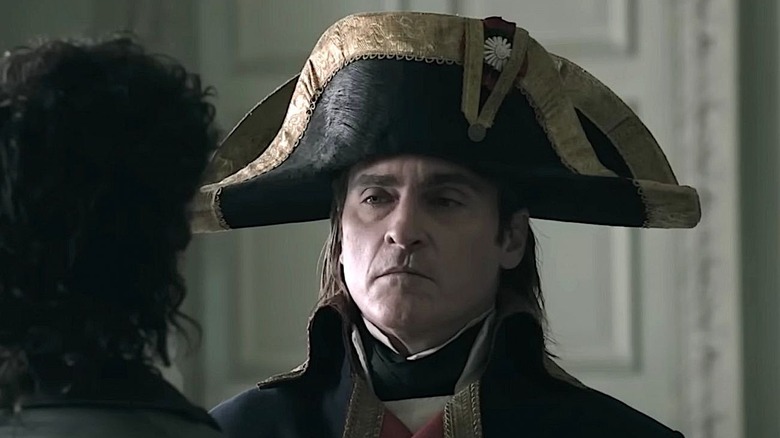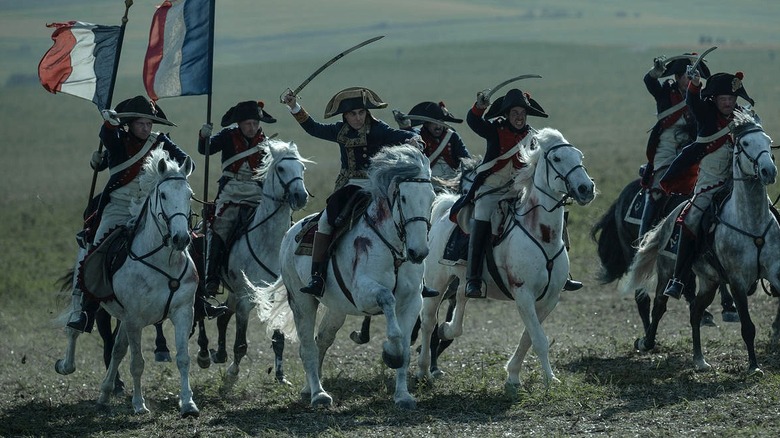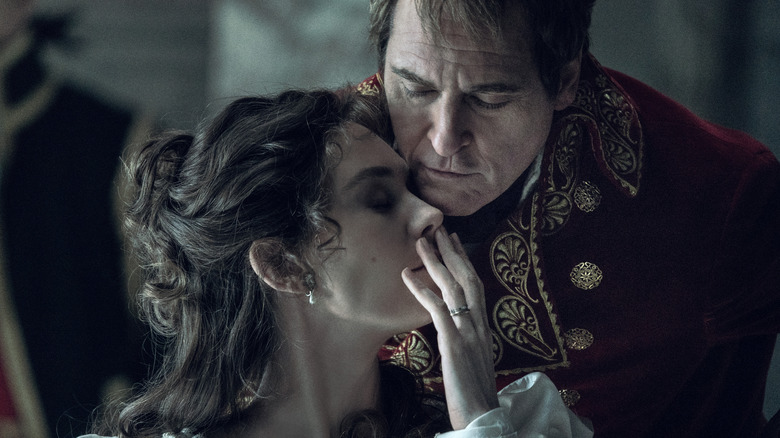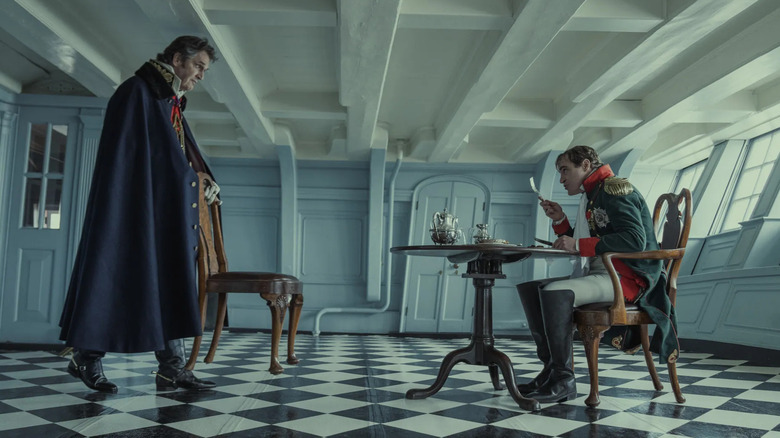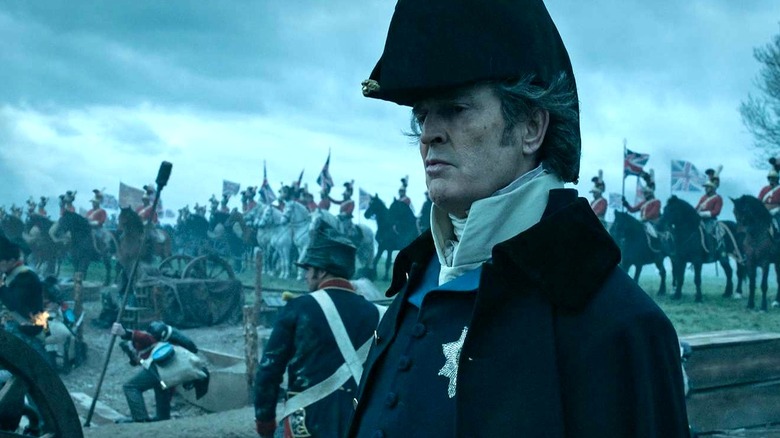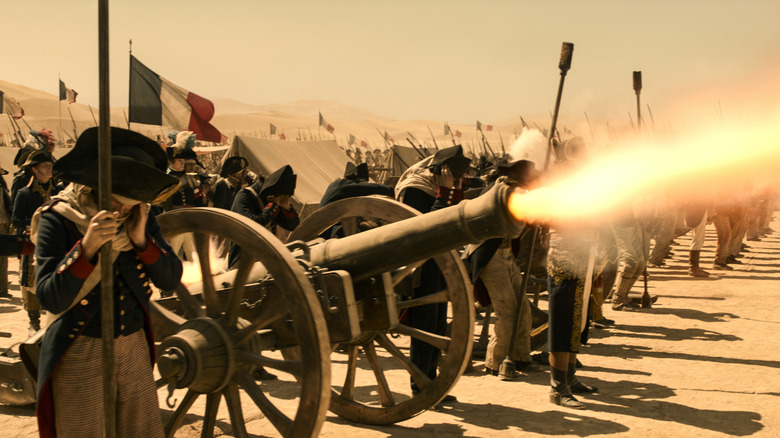Napoleon's 5 Most Controversial Historical Inaccuracies Exposed
Director Ridley Scott's latest foray into historical drama, "Napoleon," comes with a hefty dose of historical inaccuracies. While some of these are minor details, others showcase a sense of disregard for historical data when it serves the greater purpose of the movie.
This is, of course, nothing new. Throughout his career, Scott has always loved to wheel and deal with historical facts. Often, these are on point and presented with impeccable accuracy on screen. However, the venerable director has also shown that he's not afraid to make deliberate deviations from the historical narrative if it serves the purpose of his cinematic storytelling. When criticized on the matter in the past, he's made it abundantly clear that he doesn't care about accuracy and fact-checking so much as presenting a compelling and exciting adaptation. And that's well within his rights.
Even so, there are examples of these historical aberrations throughout Scott's films. "Kingdom of Heaven" has oversized armies and historically unlikely degrees of religious tolerance. "Gladiator" depicts the killing of a Roman emperor in the Colosseum and the restoration of the Roman Republic — neither of which ever happened. These details, great and small, are changes from historical consensus. Do they make Scott's movies better? In most cases, yes, but they're changes all the same, and that always attracts criticism — or at least sparks discussion. Here are five of the biggest historical inaccuracies from "Napoleon" for your reading pleasure.
Italy did not surrender without conflict
"Napoleon" speeds through the life of its titular character, following the protagonist through his rise to power in France, his overseas adventures in Egypt, and his subsequent wars that spanned the European continent. From his highs at Austerlitz to his lows in Russia, we see Joaquin Phoenix's conqueror fight countless battles as his fortunes rise and then fall over the years.
And yet, one place we never see him is in Italy. In fact, in a summarizing chunk of the movie, he simply narrates that Italy surrendered without conflict, and then the story moves on. The only problem is, Italy didn't surrender without conflict. On the contrary, it's one of the pivotal places where the Little Corporal cut his teeth and made himself known as a fearsome wartime leader.
In his early campaigns in Italy, which began in 1796, the nascent Napoleon faced off against larger international armies from Austria and their Italian allies. Despite the lopsided numbers, "Boney" flashed his brilliance over and over again, introducing revolutionary tactics as he sought to divide and conquer his enemies and constantly pushed to engage them on ground of his own choosing. He leaned heavily on his French soldiers' superior speed of movement and his own uncanny and relentless knack as a battlefield tactician. He also began flexing his muscle as a power-hungry leader by indulging in some of his own independent decision-making — even though, at this point, he was still beholden to the higher "powers that be" of the French Revolution. Taken altogether, Napoleon's early military campaigns in Italy were a critical part of his rise to power and hardly a footnote, as they're treated in the film.
Josephine just wasn't that important
Let's start this off by making something clear: Josephine was a really important part of Napoleon's life. She was his lover, his wife, and his empress. She was clearly close to him, and yes, his officially recorded final words were "France, the Army, the Head of the Army, Josephine." Where the issue arises is how Josephine (Vanessa Kirby) is represented in "Napoleon." To a degree, she's depicted as the true power behind the throne. She's heavily involved in his life and appears to be the primary reason behind some of Napoloen's much larger geo-political moves.
When the dictator leaves Egypt to return to France, for instance, the film depicts him as a heartbroken husband rushing back home to his unfaithful wife. While it's true that Josephine flirted with others and that her and Napoleon's relationship was publicly lampooned, it's hardly presented as the historical reason Napoleon left his army behind. On the contrary, historians believe he disobeyed orders and returned to France to consolidate power.
When Napoleon finally accepts the need to break things off with Josephine as a way to provide an heir to the throne, Ridley Scott's adaptation strays from historical narrative, inflating Josephine's hold on her husband's affections. It shows a nervous leader whose mother pushes him to sheepishly "test sleep" with another woman before reluctantly divorcing Josephine as a way to remarry and produce a son. In reality, the Emperor had the marriage annulled on a technicality, a fact that Encyclopedia Britannica presents as very possibly premeditated by the man himself as a potential future way out of the marriage.
The point of all of this? Josephine was a big deal to Napoleon. There's no question there, but Scott tends to exaggerate her importance in order to spice up the drama.
Napoleon didn't come face-to-face with Wellington
"Napoleon" is a movie that speeds through the life of its eponymous character, starting at the beginning of his rise to power. That means we don't meet his greatest foe, the Duke of Wellington (Rupert Everett), until toward the end of the movie. When the famous British general does show up, he presides over the French dictator's most famous defeat and subsequent capture at the Battle of Waterloo.
At the film's end, after Napoleon is finally captured, we see him interacting with his captors before he's shipped off to St. Helena. In that scene, Wellington meets with Napoleon on a vessel in the British Royal Navy. They exchange pleasantries and generally show their respect for one another. While this meeting of two great battlefield minds is fun, it turns out it never happened. In fact, the two "Great Men" never even met.
In a recent interview, Time Out spoke with Oxford University Professor Michael Broers, a leading Napoleon expert who served as the historical consultant for Ridley Scott's movie. When asked about the two men meeting, Broers cast definitive judgment on the historical accuracy of the scene by stating, "Wellington and Napoleon never met."
Wellington didn't even see Napoleon at Waterloo
The Duke of Wellington and Naploen may have never met face-to-face, but there is also a part of the movie where the British general gazes on his nemesis from afar through his telescope. Is that true, at least? For this, we can turn to the general himself for the answer.
According to the history books, Wellington's response was definitive when asked if he had seen Napoleon at the Battle of Waterloo. In the book "Notes of Conversations with the Duke of Wellington," Philip Henry, 5th Earl of Stanhope, states that Wellington said in regard to seeing the French Emperor, "No, I could not—the day was dark—there was a great deal of rain in the air."
However, while the part of the film where Wellington observes Napoleon's silhouette is fabricated, the scene where the Duke tells a sniper not to shoot at his nemesis is rooted in at least somewhat of a real version of events. The inspiration comes from a story that shows up in multiple places and is recounted differently each time.
The book "The Twelve Great Battles of England" states, "When an officer of artillery came to the duke to tell him, that he had a clear view of Napoleon, and had several guns pointed in that direction, the duke exclaimed, 'No! I'll not allow it.' It is not the business of commanders to be firing upon one another!" This likely wasn't just a commander showing respect for another military leader. Wellington knew that if Napoleon were backstabbed or blown up, he would have become a martyr. He needed to be beaten, fair and square, in battle — which he then proceeded to do.
Napoleon didn't shoot at the pyramids.
In one of "Napoleon's" more dramatic scenes, we see the rising star of the French army running amok in Egypt. He sizes himself up to a mummy and hangs around in the sandy landscape for a while before heading back to France to continue his meteoric rise, a side quest that feels random and unnecessary. Historically, Napoleon attacked Egypt and the surrounding areas as a way to threaten Great Britain's global trade routes and naval networks, and while Ridley Scott doesn't explain this in detail, he doesn't contradict it either.
However, the director does include one little tidbit that definitely didn't happen — Napoleon did not shoot at the pyramids, folks. Hate to burst your bubble on that one, but the random, over-the-top shot of Napoleon recklessly firing canons into the pyramids was added for show. While there is some evidence that his soldiers may have shot the nose off of the Sphinx, even that is in doubt.
Scott's historical consultant and Napoleon expert, Professor Michael Broers, even went so far as to openly criticize Scott's decision, telling Time Out, "I said to RS: 'Come on, shoot the top of the pyramids? But he replied, 'Well, you laughed, didn't you?' I learned that we weren't making a documentary, we were making a movie."
In the end, all of Scott's decisions, historically faithful or otherwise, fall into that category. "Napoleon" is a movie. It's a dramatic retelling. It's a biopic. The one thing it definitively is not is a pure documentary. It's fun to poke holes in the historical fabric of the story, but at the end of the day, there's little doubt that the esteemed director delivered yet another entertaining film rooted (at least partially) in the most interesting drama that history has to offer.
